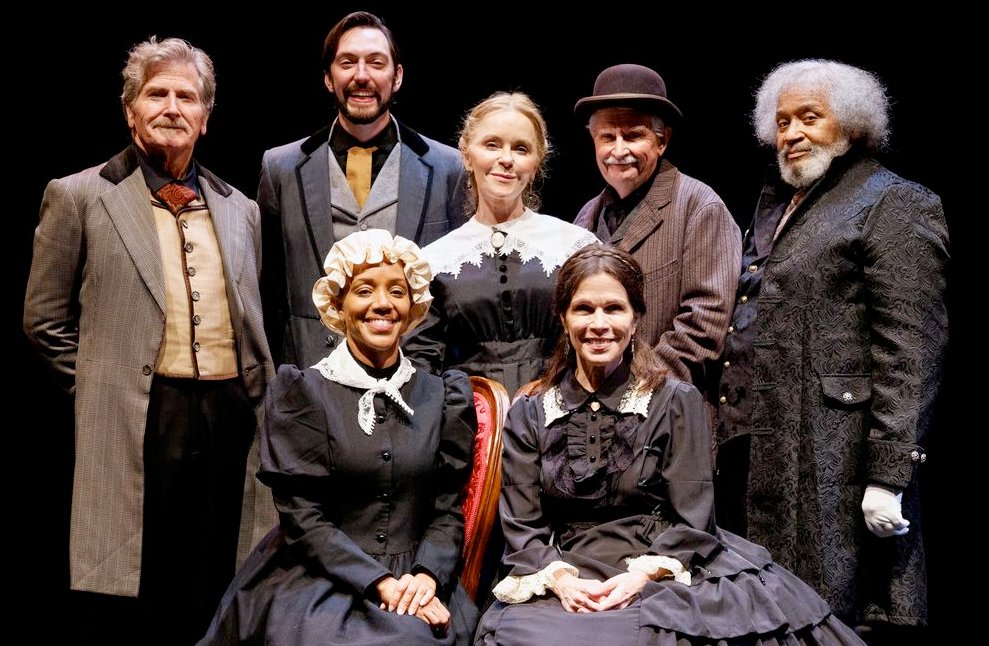LADY PATRIOT
Written and Directed by Ted Lange
Ensemble cast featuring
Jill Whelan, Fred Grandy and Chrystee Pharris
Theatre Row
Reviewed by David Spencer
I’ve never much liked the phrase “guilty pleasure,” because it tends to mean something you like despite your own usual standard, or worse, despite knowing better. When what’s really going on is that you’re giving over to something essential within yourself, that needs release—like a good cry, a good laugh, the catharsis of resolution—or the comfort of familiarity; particularize your variation. But most of the time, what’s involved, indeed what it all comes down to, is story. All those things can be experienced at any “level,” of course, but the pleasures I cite here are more populist in nature. Entire books can be (and have been) written about what that means and how it manifests—I even wrote one: The Novelizers, about media tie-in fiction, heading toward its second edition (shameless plug over)—but I think it might be summarized in a single word.
Unpretentiousness.
Ted Lange’s new play, Lady Patriot, tells a true-history tale, taking place in Alabama, spanning 1861–1863—one little-known, important and virtually begging for dramatization: That of African American slave Mary Bowser (Chrystee Pharris), unusually skilled in all aspects of housework and an expert cook, on loan from her mistress Elizabeth Van Lew (Jill Whelan) to Van Lew’s pregnant friend Varina Davis (Josie DiVincenzo); who happens to be the wife of Confederate states President Jefferson Davis (Gordon Goodman). For all her versatility, Mary still goes underestimated by the Davises; for unbeknownst to them, Mary has two more talents: she can improvise a brilliantly credible lie on the spot, and she can read. Elizabeth Van Lew, you see, is an operative for the Union army; and Mary is her eyes and ears inside the lair of the enemy. (Also part of the drama are Davis’ right hand man, Southern Jewish Judah Benjamin [Derek Emerson Powell], the elderly slave Old Robert [Count Stovall], the only one in Davis’ house who tweaks to some of Mary’s hidden gifts; and a journalist named Slydell [Fred Grandy], who is also the courier receiving Mary’s gathered intelligence from Elizabeth.)
The dramatization plays out in a straight-ahead, no-frills manner on a straight ahead, no-frills, utilitarian set. The built-in suspense of the real-life events have been carefully structured—restructured, perhaps, even repurposed—to deliver an admirable low-key drama of Civil War espionage. In certain respects, it has the characteristics of a TV movie. But this has a natural flow, too: Mr. Lange, perhaps best known as a TV star (dozens of credits, though most famous as bartended Isaac Washington on the mid-‘70s hit The Love Boat and its periodic revivals), would have absorbed much of his playwrighting craft from the hundreds of teleplays in which he acted.
And it’s among the strongest things (among many) in Lady Patriot’s favor. Science fiction icon Isaac Asimov once responded to charges that his prose wasn’t especially stylish with the assertion that what it did possess, always, was clarity, often about complex subjects; and he invited anyone who thought clarity was easy to try it sometime. Mr. Lange, as a dramatist, possesses exactly the same gift. If the characters aren’t flashy, they’re nonetheless immediately vivid and distinct; if the dialogue doesn’t have a high quip quotient, it has the insistence and economy of a page-turner potboiler. There are pauses enough to establish increasingly deep characterization and let the emotion of a scene register, but, until right at the end (where, arguably, Mr. Lange’s “sum up” is a bit too “on the nose,” particularizing the present-day metaphors that have long been implicit), none of that is overwritten either. That Lady Patriot is natively a play rather than a teleplay is characterized by the length of its scenes, but even in the most extended, the story keeps moving apace, no fat to trim. And as this might imply, Mr. Lange has avoided the trap of historicity—exposition and your historical education are rarely laid bare; they’re camouflaged to be absorbed without conscious realization; re Larry Gelbart’s dictum, “No exposition except in anger”—or by extension, conflict.
The performances are likewise efficient, memorable and under the direction of the author, starkly contrasted. The spectacularly successful screenwriting team of Lowell Ganz and Babaloo Mandel have a dictum that every character makes his first entrance “carrying an axe”—meaning with an issue to resolve already in play. And in Lady Patriot, from the moment each new character speaks, we not only know (or think we know, when the deception is intentional) what the axe is, but we feel instinctively that there’s a suspenseful distance to travel. (With an ensemble this evenly matched it’s terribly unfair to cite favorites, but I have to say that Jill Whelan’s command of the southern belle spymaster took me by surprise; and burly, basso-voiced Count Stovall’s Old Robert kept getting richer for as he measuredly continued to allow facets to emerge that he’d kept under wraps for decades.)
Speaking of travel, Lady Patriot is built for it. Though it covers a good deal of complex ground, the simplicity of its production needs and its manner of telling an uncomfortable story in a comfortable way—by which I mean, you relax into the sensation of knowing you’re in good hands, even though your desire to know what happens next is compulsive—will potentially make it a popular candidate for regional, stock and amateur productions. Not to mention its much needed true-American spirit.
I don’t mean to imply that Lady Patriot is a masterpiece. But it’s the kind of sleeper surprise you love to encounter. Bursting with what I can best describe as old-fashioned freshness…
